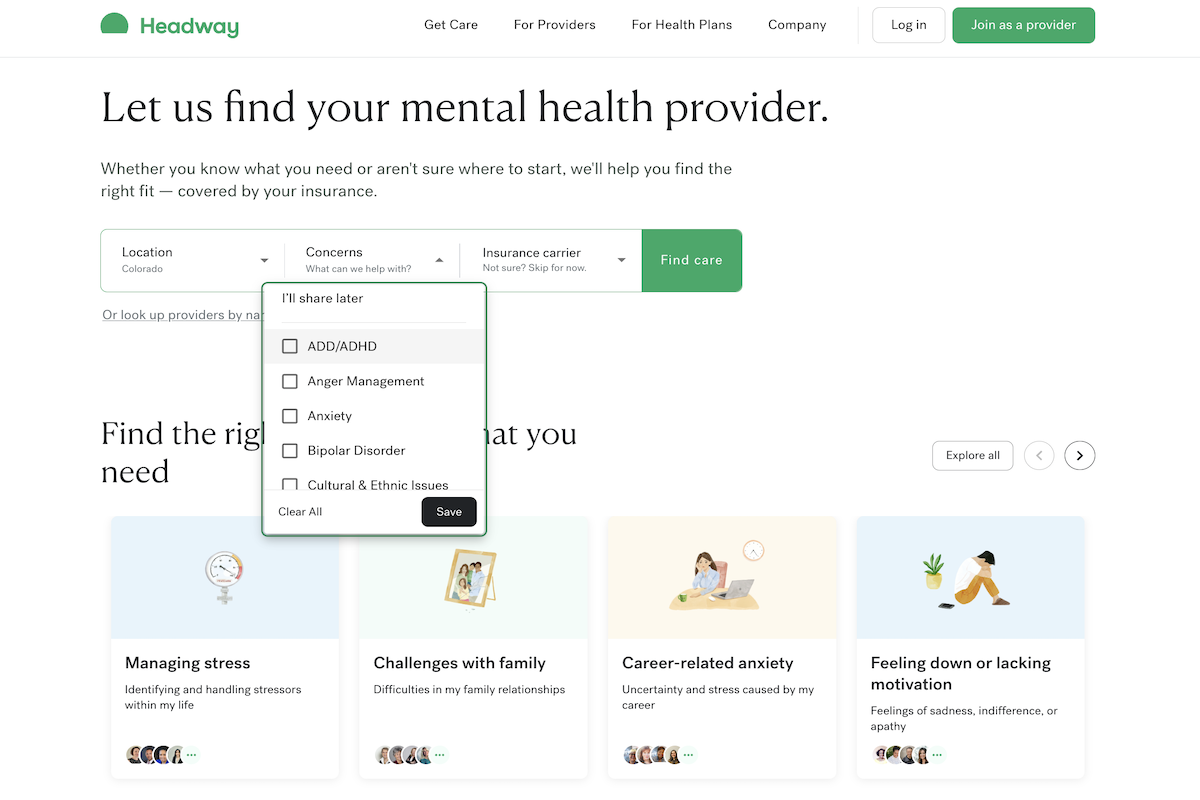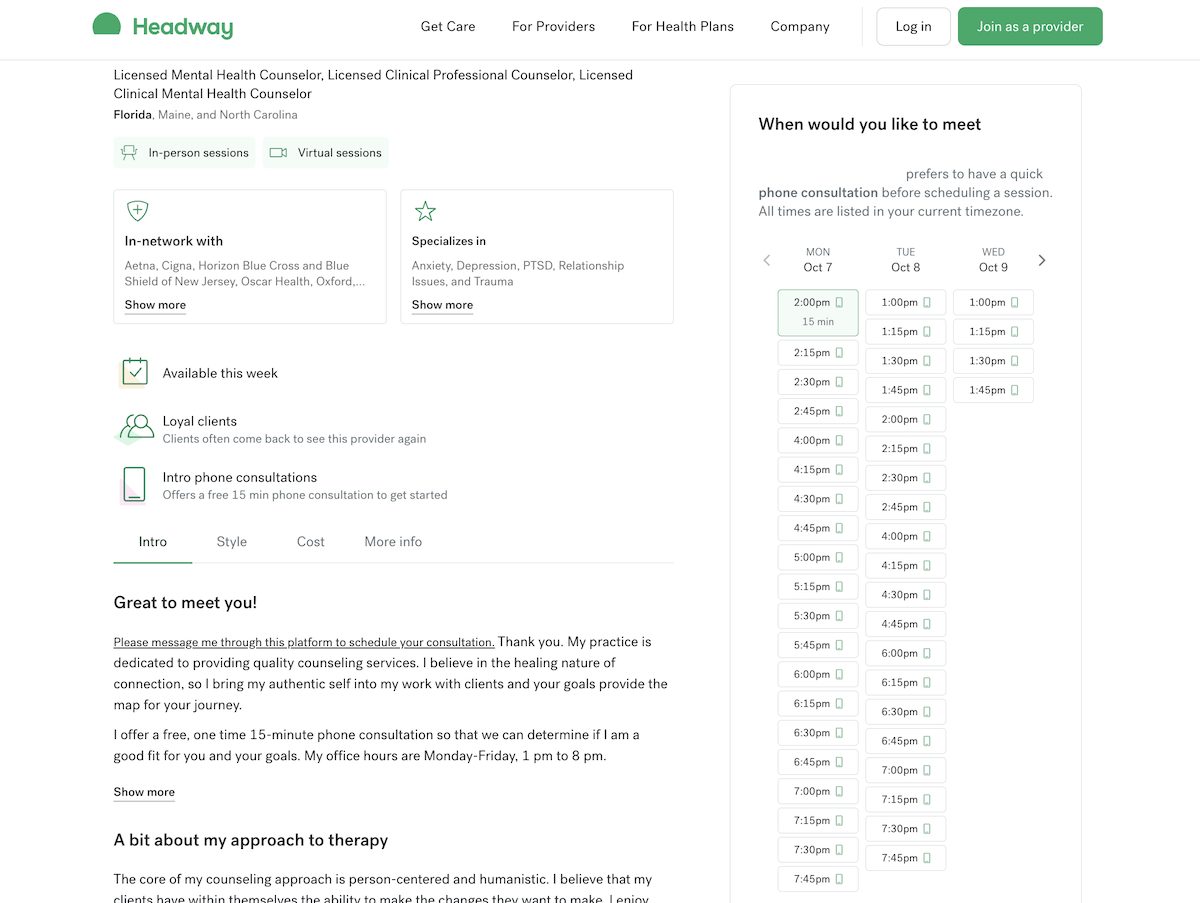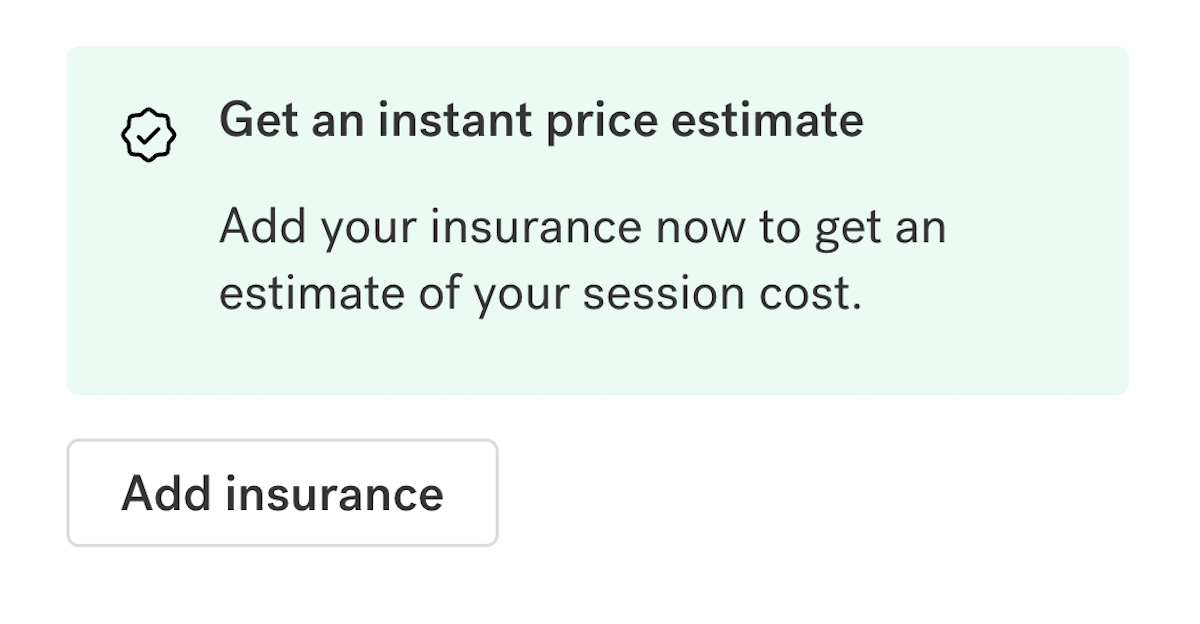Table of Contents
- We have spent more than 12,000 hours researching over 87 online therapy platforms, and our testers have signed up for the 37 most popular platforms to bring you our top picks.
- Our testers focus on the sign-up process, therapist selection, scheduling, therapy session quality, switching therapists, and customer service interactions.
- We have surveyed over 2,800 online therapy users, held focus group interviews with both users and therapists, and consulted over 60 mental health experts.
- We score each platform according to affordability, data privacy, availability, and diversity of therapists.
- Our pages are updated regularly to update pricing and service information and reflect our ongoing testing of new online therapy platforms.
- Learn more about how we tested Headway.
Key takeaways
- We recommend Headway if you want to use insurance to pay for therapy sessions, though the number of insurance plans they currently accept is limited.
- Headway sessions typically cost $20 to $50 with insurance copays. The platform does not usually accept self-paying patients, but some exceptions may apply.
- Headway has several filters you can use to find a therapist or psychiatrist.
- Headway is a non-subscription-based service. The only charges are for your therapy sessions.
Therapy can be expensive. Research shows that the cost of therapy can be as much as $200 or more per session. For some, that high cost means that the only way they can afford mental health care is by using their insurance. Headway serves those people. Our Headway therapy review explains how you can use your insurance to schedule in-network therapy visits, and how sessions may be more affordable based on your insurance copay.
You also want an online therapy platform that will address your needs, whether that’s a diverse pool of therapists to choose from, evening appointments, or data privacy. Read our review to learn more about Headway and find out if this platform is right for you.
Headway Overview
What is Headway?
Headway is a mental health therapy platform that provides affordable and accessible therapy and psychiatry services for children age six and older, teens, adults, and couples. The platform is designed for people who are using their insurance to pay for therapy, and there’s no subscription cost to use Headway. Your insurance copay is your only cost.
Patient care is personalized to the client. The way you communicate with your therapist, the length of your sessions, and cancellation policies vary based on each individual therapist. Headway hosts providers who can treat a number of mental health conditions, including anxiety, depression, grief, eating disorders, and post-traumatic stress disorder (PTSD). You can use the site’s search filters to find and select your therapist based on a specific condition, with options for gender, ethnicity, and available appointment times.
How Headway works
Headway connects people who need mental health services with therapists and psychiatrists. The process is straightforward: use the filters to choose your state, insurance carrier, and provider preferences. From the list of providers that’s returned to you, choose a provider and make a session appointment. The site will then take you to the account signup page if you have not already created an account.
Sessions are generally 60 minutes long, but the length of your session may be different depending on your chosen provider. Sessions are held online, though some providers also offer the option for in-person visits. Headway does not have an app.
How to sign up for Headway online therapy/psychiatry
To sign up, our testers entered basic details, selected their state of residence, issue of concern, and insurance company. Next, they used the filters to select for availability, ethnicity, and gender, and then reviewed the available providers from the list before making an appointment.
Our testers did find the experience confusing at times. First, they thought that their only option was to use insurance to pay for their sessions, but there’s a new option to pay out of pocket if you can show that you have an insurance plan that Headway is not in-network with or can’t support, or if you lose your in-network coverage while receiving care through Headway.
From one of our Headway testers:
“I didn’t like that the insurance policy isn’t written clearly somewhere during sign-up. I spent time signing up and choosing my therapist, only to have to contact customer service to see if there was a private pay option.”

How to match with an online therapist/psychiatrist
Matching with a therapist was an easy process for our testers. You can look for providers that accept your insurance and filter them according to language spoken, availability, ethnicity, and gender. From your filtered list, select providers to read their “about me” pages. Our testers liked how much information they could see about each therapist before making a selection. “For each provider, you’ll see their bio, what they specialize in, insurance providers accepted, counseling style, cost, counseling style, and more. You can also see their availability, including open time slots,” one tester said. Once you have settled on the provider who seems like the best fit for you, you can make an appointment.
Some providers offer a free 15-minute initial consultation to find out more about their therapy methods and policies and whether they will be a good fit for you.

From one of our Headway testers:
“You’re also able to choose whether you’re looking for a psychiatrist or nurse practitioner who can help with medication management.”
Live video sessions
Many, but not all, of the therapists working through Headway see patients both in-person and virtually. For this review, our testers focused on virtual visits and found that using live video for therapy sessions was a smooth process.
We reached out to Headway customer service to ask if there were other ways to meet with or contact our therapist, such as by text or chat. They told us that “telehealth sessions on Headway must contain both an audio and video component, but you are welcome to discuss with your provider how to best reach them outside of sessions.”
Cost and payment
Sessions typically cost $20 to $50 with copays. We like that clients can see how much their insurance copay going to be before making an appointment.

Like Talkspace, the Headway platform makes mental health therapy more accessible to more people thanks to the fact that it accepts insurance. Unlike Talkspace, Headway is not a subscription service, so you can schedule sessions as needed.
Is Headway covered by insurance?
Headway providers accept Aetna, Anthem Blue Cross and Blue Shield, Cigna, Oscar, Oxford, United Healthcare, and Optum affiliates, with more insurance carriers being added.
You can use the site filters to find therapy providers who accept your insurance. Headway does not currently accept Medicaid coverage, but it does accept some insurance plans that are in partnership with Medicare.
How to save money on Headway
Headway doesn’t offer financial aid or sliding-scale fees, and they do not use a subscription structure for its services, so they don’t have sign-up specials like some online therapy platforms do. Costs are significantly lower on Headway than many of the online therapy platforms we have researched and tested, with copay costs typically between $20 and $50.
Our experience with Headway customer service
You can’t contact Headway customer service at all before creating an account. This is definitely a drawback for our Handbook Team. We would prefer to be able to have any questions or concerns answered before sharing personal information like our name and email address.
We have found that it’s easier when a platform has a straightforward way to get questions answered, such as by email or phone, before the sign-up process, like Brightside does.
Once you have an account, however, customer service responds pretty quickly. We sent our questions via Headway’s online response form and received emailed answers the next day.
From one of our Headway testers:
“Although I disliked not being able to contact customer service without an account, once I had an account and reached out to them, it was a quick turnaround with responses.”
Our Headway testing experience
The Handbook Team has spent over 12,000 hours researching more than 87 online therapy platforms. We identified the top 37 platforms and personally tested each one. We also regularly facilitate focus groups and run surveys to understand the online therapy experience firsthand. To date, we have surveyed more than 2,800 online therapy users.






Our team’s primary goal with all of our reviews is to give our readers insight into what it’s like to be a client who is seeking therapy.
With Headway, we started by creating an account and going through the intake process. We were able to review therapists’ bios and information and schedule a therapy session. We love that Headway is a subscription-free service that connects you with mental health providers who take your insurance. The team also appreciates the variety of filters that help you find the therapist that’s right for you.
To test Headway, we evaluate a variety of factors to help readers understand where this brand shines and where it falls short, including:
- User experience: Our testers explore every corner of the Headway website and take notes on functionality and usability. In particular, we research how easy or difficult it is to find and book with a therapist.
- Diversity of therapists: We conduct provider searches in multiple geographic areas to explore the number and type of therapists available. Our testers select a provider by using the platform’s search filters and reading provider profiles.
- Affordability: We ask testers to evaluate the platform’s affordability by exploring options for self-pay, insurance payment, and sliding scale fees.
- Customer service: Each Headway tester contacts customer service and takes notes on how their concerns are addressed.
To learn more about how we test and score online mental health platforms, read our methodology.
Our Headway testing process
Compare Headway
Some of the other online therapy platforms we’ve reviewed, like BetterHelp and Online-Therapy.com, don’t accept insurance. Headway makes online counseling more affordable by allowing clients to use insurance for payment. They don’t accept as many insurance providers as Talkiatry does, but Headway is still one of the less expensive options for getting the mental health care you need.
| Monthly cost | $80-$200 | $260-$400 | $276-$436 | $95-$349 | $200-$440 |
| Insurance accepted? | Yes | No | Yes | Yes | No |
| Services | Children, teens, adults, couples therapy; psychiatry | Individual | Teen, adult, couples therapy; psychiatry | Teen, adult therapy; psychiatry | Individual, couples therapy |
Our final verdict
If you want to use your insurance to see an in-network therapist, Headway is a good therapy platform to consider. Headway provides a site filter to choose your needs and preferences for a therapist, such as for specific mental health issues, and therapist gender and ethnicity. You can then read through each therapist’s background and availability and choose the one that feels like a good fit for you. You can also easily change therapists by simply making an appointment with someone else. There’s no subscription fee to use the platform and costs are manageable at $20 to $50 per session, depending on your insurance copay.
We don’t like that users have to create an account before being able to access customer service to get basic questions answered.
Headway is a simplified source for locating therapists. The site doesn’t include any bells and whistles like chat functionality or videos. Yet for what it offers to patients who need to use their insurance to pay, Headway is a stable and straightforward option.
Frequently asked questions
Headway connects you with therapy and psychiatry providers and accepts insured patients—the platform also accepts private pay if you have insurance that is not in-network with Headway or if you lose your insurance while receiving care through Headway (your provider will need to approve the private pay option). BetterHelp is a subscription service that matches you with a therapist and offers tools like journals and worksheets, but it does not accept insurance.
Headway shares some information it receives from clients. Read Headway’s privacy policy to learn more.
Headway sessions are typically 60 minutes long, but session lengths can vary depending on the provider you’re working with.
“A good length for a therapy session typically ranges from 45 to 60 minutes. If the session is too short, it may be difficult to explore issues thoroughly. Ultimately, the ideal length for a therapy session will depend on the individual, their concerns, and the therapist’s approach,” says Alexandra Stratyner, PhD, a psychologist with Stratyner and Associates in New York.











